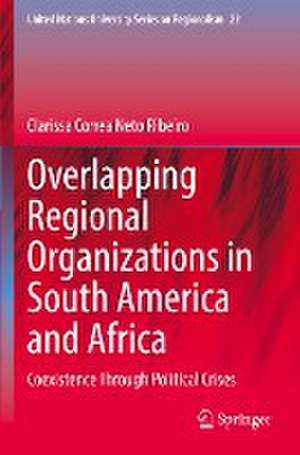Overlapping Regional Organizations in South America and Africa: Coexistence Through Political Crises: United Nations University Series on Regionalism, cartea 22
Autor Clarissa Correa Neto Ribeiroen Limba Engleză Paperback – 2 iun 2023
| Toate formatele și edițiile | Preț | Express |
|---|---|---|
| Paperback (1) | 690.94 lei 6-8 săpt. | |
| Springer International Publishing – 2 iun 2023 | 690.94 lei 6-8 săpt. | |
| Hardback (1) | 697.15 lei 6-8 săpt. | |
| Springer International Publishing – iun 2022 | 697.15 lei 6-8 săpt. |
Din seria United Nations University Series on Regionalism
- 15%
 Preț: 647.27 lei
Preț: 647.27 lei - 24%
 Preț: 790.73 lei
Preț: 790.73 lei - 18%
 Preț: 738.20 lei
Preț: 738.20 lei - 15%
 Preț: 645.47 lei
Preț: 645.47 lei -
 Preț: 393.35 lei
Preț: 393.35 lei -
 Preț: 395.09 lei
Preț: 395.09 lei - 15%
 Preț: 647.08 lei
Preț: 647.08 lei - 15%
 Preț: 651.67 lei
Preț: 651.67 lei - 18%
 Preț: 893.05 lei
Preț: 893.05 lei - 15%
 Preț: 641.20 lei
Preț: 641.20 lei -
 Preț: 442.46 lei
Preț: 442.46 lei - 18%
 Preț: 721.81 lei
Preț: 721.81 lei -
 Preț: 425.42 lei
Preț: 425.42 lei - 15%
 Preț: 646.11 lei
Preț: 646.11 lei - 18%
 Preț: 783.68 lei
Preț: 783.68 lei - 15%
 Preț: 691.91 lei
Preț: 691.91 lei - 18%
 Preț: 727.80 lei
Preț: 727.80 lei - 18%
 Preț: 797.24 lei
Preț: 797.24 lei - 20%
 Preț: 560.31 lei
Preț: 560.31 lei -
 Preț: 433.68 lei
Preț: 433.68 lei - 15%
 Preț: 636.12 lei
Preț: 636.12 lei - 18%
 Preț: 940.09 lei
Preț: 940.09 lei - 20%
 Preț: 577.19 lei
Preț: 577.19 lei - 15%
 Preț: 642.51 lei
Preț: 642.51 lei -
 Preț: 394.12 lei
Preț: 394.12 lei -
 Preț: 391.61 lei
Preț: 391.61 lei
Preț: 690.94 lei
Preț vechi: 812.87 lei
-15% Nou
Puncte Express: 1036
Preț estimativ în valută:
132.23€ • 137.54$ • 109.16£
132.23€ • 137.54$ • 109.16£
Carte tipărită la comandă
Livrare economică 14-28 aprilie
Preluare comenzi: 021 569.72.76
Specificații
ISBN-13: 9783030989026
ISBN-10: 303098902X
Pagini: 156
Ilustrații: XVIII, 156 p. 5 illus. in color.
Dimensiuni: 155 x 235 mm
Greutate: 0.25 kg
Ediția:1st ed. 2022
Editura: Springer International Publishing
Colecția Springer
Seria United Nations University Series on Regionalism
Locul publicării:Cham, Switzerland
ISBN-10: 303098902X
Pagini: 156
Ilustrații: XVIII, 156 p. 5 illus. in color.
Dimensiuni: 155 x 235 mm
Greutate: 0.25 kg
Ediția:1st ed. 2022
Editura: Springer International Publishing
Colecția Springer
Seria United Nations University Series on Regionalism
Locul publicării:Cham, Switzerland
Cuprins
- 1. Introduction. - 2. Regionalism in the Global South: Institutional Mapping of the Scenarios of Overlapping. - 3. Overlapping Organizations and Political Crises in Africa. - 4. Overlapping Organizations and Political Crises in South America. - 5. Analysis and Conclusion: Comparative Regionalism, Political Crises, De Facto Overlapping, and Regional Cohesion. - 6. Final Considerations.
Notă biografică
Clarissa Correa Neto Ribeiro holds a PhD and a master’s degree in International Relations from the San Tiago Dantas Graduate Program (UNESP/ UNICAMP/ PUC-SP), and a bachelor’s degree in State Sciences (Ciências do Estado) from the Minas Gerais Federal University (UFMG), Brazil. She has received the CAPES scholarship of the Brazilian government through her master's and PhD degrees, in addition to a CAPES PrInt postdoctoral scholarship at the San Tiago Dantas Graduate Program. She has been a visiting exchange student at the Universidad de la Republica (Uruguay) with funding provided by the AUGM Programa de Escala de Pos Grado (2015), and a visiting doctoral fellow at the German Institute of Global and Area Studies - GIGA, in Hamburg, Germany. She is a member of the Research Network on Foreign Policy and Regionalism (REPRI) and the Regionalism Observatory in Brazil, where she has acted as a student coordinator. She has research experience in regional integration and regionalism, and has investigated mainly processes in Latin America and Africa through comparative regionalism, with a work focus on overlapping regional institutions.
Textul de pe ultima copertă
This book discusses the interaction between and the impact of overlapping actions by regional organizations while dealing with critical events. It compares all the sub-regions in South America and Africa from this perspective and creates new knowledge through cross-regional gleanings. The book analyses types of institutional interaction among regional organizations and the effects of overlapping actions on the coexistence or fracturing of regional processes. It examines and compares the dynamics of these interactions in both South America and Africa. The book contributes to the study of comparative regionalism by providing generalization and institutional learning based on a cross-regional approach. It gives to students, researchers and interested readers an understanding of the complexity of regional affairs in multi-organizational environments.
Caracteristici
Compares regionalism through organizational dynamics in all subregions of Africa and South America Addresses political crises, core issues for democracy, and interactions between multiple regional actors Contributes to comparative regionalism studies
